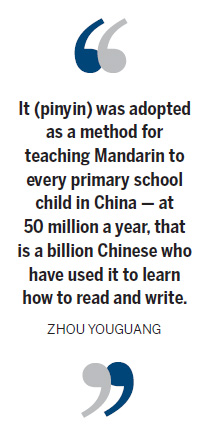China Face
Father of pinyin
Updated: 2011-01-21 11:20
By Alan Simon (China Daily European Weekly)
"It is not perfect but it has worked."
 |
Zhou is especially thankful his peers allowed him to base pinyin on the Roman alphabet.
"I met with great resistance from them over that issue," he says.
"But I insisted on it. Perhaps it was due to my time overseas but I always envisaged pinyin being useful to foreigners, too. I still see it as a bridge between China and the rest of the world, a bridge between cultures."
Events have certainly vindicated him. The International Organization for Standardization acknowledged pinyin in 1982 as the standard system for Chinese phonetic instruction and it has also had the seal of approval from various other bodies, including the United Nations.
Nor has it escaped this centenarian's attention that pinyin has gained a new following in the IT age.
"Did you know Chinese people use it to send messages on their cell phones and to type into keyboards - that makes me very happy!" he says with a broad grin.
It is not unreasonable to see pinyin's usefulness here and overseas as a death knell for Chinese characters but Zhou rejects the notion.
"If you want to use pinyin to write Chinese, that's OK but it only exists as an aid for Chinese characters, not to replace them. If that were not official policy people would oppose its use altogether. Could the characters ever be cast aside? Not for a thousand years - or more."
On the wall hang all too few photographs of Zhou's life. One with pride of place is that of his late wife, Zhang Yunhe, who died in 2002 at the age of 93.
"We were married in 1933 and stayed happily together for, wait, 69 years," he says, quickly doing the math.
The couple had a daughter, who died at the age of six, and a son, who still lives in Beijing. "He's my old baby - he is 78," says Zhou.
There is also a granddaughter in the United States and a great-grandson, who will soon go to university.
Too many of his memories are now in his mind alone.
"During the 'cultural revolution' (1966-76) I was sent to the countryside to be re-educated by the farmers," he says, without a hint of resentment.
"During that time my house was occupied and all my photographs - with Mao, with my pinyin research colleagues - were destroyed."
Without any need, this humble man repeatedly apologizes.
"Please bear with me - my health is still good but my hearing is not what it was," he says.
Specials

President Hu visits the US
President Hu Jintao is on a state visit to the US from Jan 18 to 21.

Ancient life
The discovery of the fossile of a female pterosaur nicknamed as Mrs T and her un-laid egg are shedding new light on ancient mysteries.

Economic Figures
China's GDP growth jumped 10.3 percent year-on-year in 2010, boosted by a faster-than-expected 9.8 percent expansion in the fourth quarter.